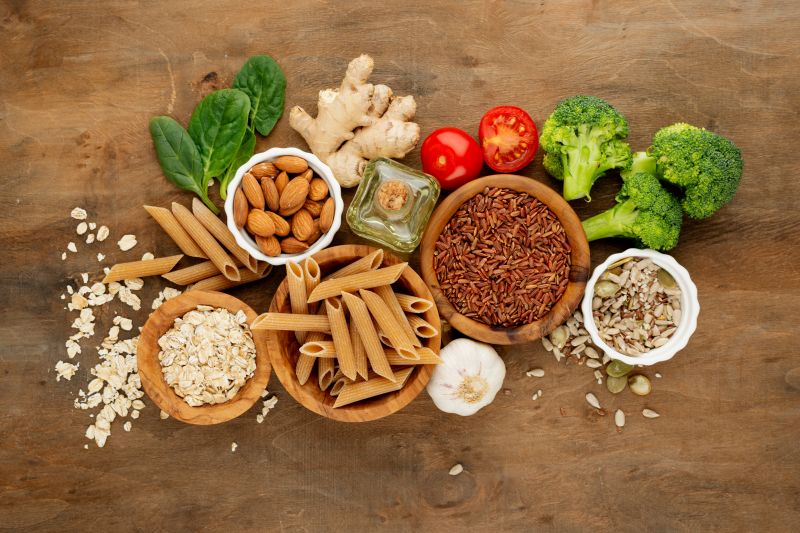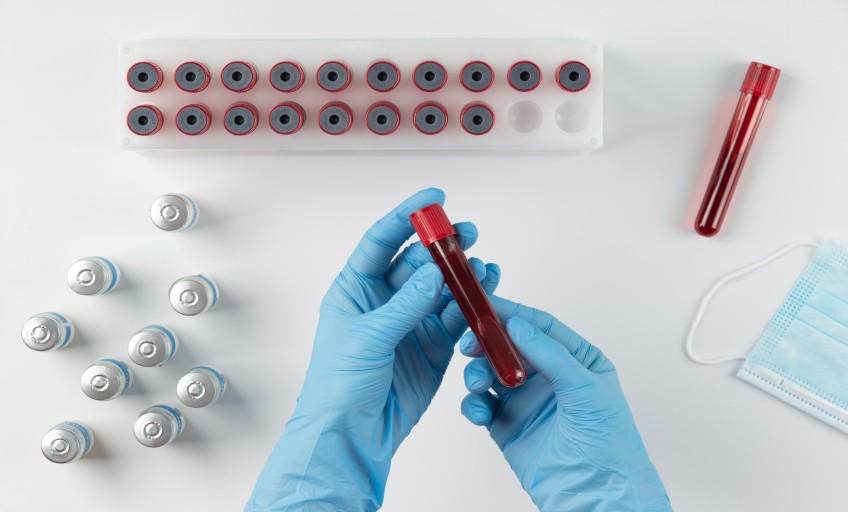Key Takeaways
- Fiber slows blood sugar absorption and improves digestion and satiety.
- Healthy fats improve heart health, reduce inflammation and balance blood sugar levels.
- Protein helps maintain muscle mass and regulates blood sugar.
- Incorporate fiber, healthy fats and protein in your diet for diabetes management.
The food you eat plays a key role in effective diabetes management. Be sure to add foods with fiber, healthy fats, and protein to your diet to reduce the risk of diabetes.
What you need to know:
- The importance of fiber in diabetes management
- The importance of good fats for diabetes
- The power of protein in diabetes management
- Incorporating fiber, fats, and protein in your diabetes management diet
The importance of fiber in diabetes management

Fiber is a carbohydrate found mainly in fruits, vegetables, whole grains, and legumes. The following points highlight the importance of fiber for diabetes:
Slows down blood sugar absorption
Fiber provides many health benefits for people with diabetes or prediabetes. Because the body doesn’t break it down, it does not cause blood sugar to spike like other carbohydrates. Soluble fiber can also slow the absorption of sugar. A healthy diet with insoluble fiber may also reduce the risk of developing type 2 diabetes.
Improves digestion
Fiber maintains digestive health, cleanses the digestive tract, and helps remove unwanted buildup, improving gut health and reducing the risk of colon cancer. Soluble fiber dissolves in water and forms a gel-like substance in your stomach, slowing digestion. This helps control your blood sugar and cholesterol.
Keeps you full for longer
Since fiber isn’t digested, it moves slowly through the stomach, making you feel fuller for longer. This can help you lose or maintain your weight. High-fiber foods are more filling than low-fiber foods as eating them takes longer and is less ‘energy-dense’, so you will likely eat less and stay satiated longer.
Minimizes Risk of Diabetes Complications
Maintaining stable blood sugar levels and a healthy weight can help reduce the risk of complications associated with diabetes, such as neuropathy, retinopathy, and cardiovascular issues.
The importance of good fats for diabetes
Healthy fats offer a range of benefits for people with diabetes, providing crucial support for their overall well-being. The following points highlight the importance of healthy fats for diabetes.
Improves heart health
As diabetes increases the risk of heart complications, incorporating healthy fats into your diet reduces this risk by improving cholesterol levels and supporting overall heart health.
Reduces inflammation
Monounsaturated and polyunsaturated fats, also known as ‘good’ fats, can help reduce inflammation. For example, fatty fish like salmon, sardines, and mackerel contain omega-3 fatty acids that can reduce inflammation and protect blood vessel cells.
Helps balance blood sugar levels
Consuming healthy fats improves insulin sensitivity and regulates blood sugar levels, vital for diabetes management. It also helps with post-meal glucose control and supports healthy cholesterol levels.
The power of protein in diabetes management

Protein can be important in managing diabetes because it can help stabilize blood sugar levels and improve glucose control. The following points highlight the importance of protein for diabetes.
Helps maintain muscle mass
Protein can help maintain muscle mass in people with diabetes. It is essential for muscle repair and growth. It can help improve insulin sensitivity and overall metabolic function. Some experts recommend increasing protein intake by 5–10% of the current intake in people with diabetes.
Blood sugar regulation
When eaten with carbohydrates, protein can help slow the release of glucose into the bloodstream, which can help keep blood sugar levels in a normal range. It can promote insulin secretion, which can help clear glucose from the blood.
Incorporating fiber, fats, and protein in your diabetes management diet
Incorporating fiber, fats, and protein in your diet can help manage diabetes by regulating blood sugar levels:
- Fiber: Fiber-rich foods include fruits like apples, bananas, and oranges. Also, vegetables like broccoli, carrots, sweet potatoes, whole grains like oats, brown rice, and quinoa, and legumes like peas, lentils, and black beans. You can also take fiber supplements or eat enriched foods. However, you should increase fiber intake slowly to avoid digestive discomfort.
- Fat: Healthy fats, like those found in nuts, seeds, oils, fatty fish, and avocados, can help slow down glucose absorption into the bloodstream.
- Protein: Healthy protein sources include lean meats, fish, eggs, beans, soy, and nuts. Greek yogurt is a good option for people with diabetes because it is high in protein and low in carbohydrates.
It is advisable to limit red meat and avoid alcohol, tobacco, refined sugar, and processed, refined, and fried foods. A variety of healthy foods from all food groups is best for people with diabetes.
Stay tuned to the Activ Living Community. Keep up to date with the latest health tips and trends through expert videos, podcasts, articles, and much more on nutrition, fitness, mindfulness, and lifestyle conditions like Asthma, Blood Pressure, Cholesterol, and Diabetes. Activ Living ke saath sahi sehat ki shuruat ABHI karo.
You may also be interested in the following blogs:
Popular Searches
How to lower blood pressure | Fruits good for liver | Unhealthy foods | Ragi Benefits | Basal Metabolic Rate | Acupressure points for High Blood Pressure | Ayurvedic medicine for blood pressure | How to control cholesterol at home | Homeopathy for Asthma | Biological Age | Home remedies for TB | Natural beta blockers | Negative effects of internet | Types of walking | Blood pressure calculator | Blood sugar calculator | BMI Calculator





 1800-270-7000
1800-270-7000








